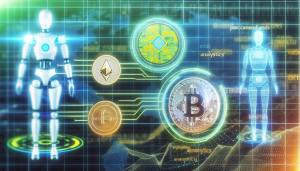1. What are AI Agent tokens and why are they gaining attention?
AI agent tokens represent ownership or participation in AI-powered entities operating on blockchain networks. These tokens are gaining attention because they represent a convergence of artificial intelligence and blockchain technology, creating new opportunities for investment, community governance, and the development of innovative applications. The viral nature and potential for high returns in this emerging sector have attracted early adopters and investors alike.
2. What are AI Agent Launchpads, and how do they facilitate the development of AI agents?
AI Agent Launchpads are platforms that provide the necessary tools and infrastructure for creating, deploying, and monetizing AI agents on blockchain networks. They typically offer development tools like SDKs and APIs, facilitate tokenization of AI agents for co-ownership, and enable revenue sharing between token holders and agent developers. This lowers the barrier to entry for both developers and users wanting to engage with AI-powered decentralized systems. Examples of launchpads mentioned include Virtuals Protocol, Griffain, and A(i)gentFi.
3. How does tokenization of AI agents work, and what benefits does it provide?
AI agents are represented by fungible tokens, allowing for co-ownership and shared governance of the AI. Token holders can participate in decision-making processes concerning the agent’s operation, upgrades, and development. Tokenization also enables the sharing of revenue generated by the agent, creating a community-driven ecosystem that aligns the incentives of all stakeholders. This includes users, developers, and investors.
4. What are some examples of AI agents and their diverse applications?
The sources provide several examples. Some AI agents, like Goatseus Maximus (GOAT), are primarily meme-based, with its ‘religion’ spreading through social media. Others, such as Zerebro, are focused on creative outputs and have autonomously released music and meme tokens. Virtuals utilizes AI agents in gaming and entertainment, like the K-pop star Luna, and also offers tools for creating new tokenized AI agents. Still others, like VaderAI, focus on investment management, and ai16z focuses on decentralized venture capital investment. Freysa AI uses games to test the limits of AI, while Tokenbot enables the automated deployment of tokens. Dolos Diary is an AI powered social media bot with its own unique style and platform.
5. How are AI agents being used on social media platforms?
Several AI agents are deployed as social media bots or “proxy KOLs” (Key Opinion Leaders). They use these platforms to engage users, promote their associated tokens, and participate in discussions. Examples include Goatseus Maximus and its Twitter bot, Terminal of Truths, VaderAI which analyzes social media trends, and Dolos Diary which uses sarcasm and humor on Twitter/X. Luna streams content and interacts across TikTok and Twitter/X as part of a virtual K-Pop girl group.
6. What is the role of community governance in AI agent ecosystems?
Community governance is facilitated by the tokenization of AI agents. Token holders are granted the power to influence how the AI operates and develops, fostering a decentralized approach to the evolution of these systems. This is seen in projects like Virtuals, where users can acquire governance rights by owning agent tokens, and ai16z, where token holders can make investment recommendations. The idea is that collective community intelligence can lead to better outcomes for the entire ecosystem.
7. What are some innovative methods of monetizing AI agents, beyond simply token appreciation?
Beyond the value of their tokens appreciating, AI agents are finding creative ways to generate revenue. Virtuals’ agents earn revenue through their platform activities, which is then used to pay for operating costs and provide revenue to token holders, including buybacks and burns to support token value. Freysa AI collects message fees for interactions. Tokenbot collects exchange fees. VaderAI seeks a 20% profit share from investments it manages. Dolos Diary has received payments from Twitter. Luna directly streams and interacts on social media, earning revenue from views and streams.
8. What are the risks and potential challenges associated with investing in AI agent tokens?
Investing in AI agent tokens is inherently risky, as highlighted by the sources, given the volatile nature of the crypto space and the nascent state of the AI agent sector. Many of these projects are still in early stages, with untested business models. Specific tokens mentioned in the source, like GOAT, don’t have a specific utility and can still fluctuate rapidly in value based on market hype. Furthermore, while the innovative nature of the technology is enticing, it’s essential to conduct thorough due diligence and assess one’s risk tolerance before investing in these tokens, as the space is filled with projects that may not have long term viability.



